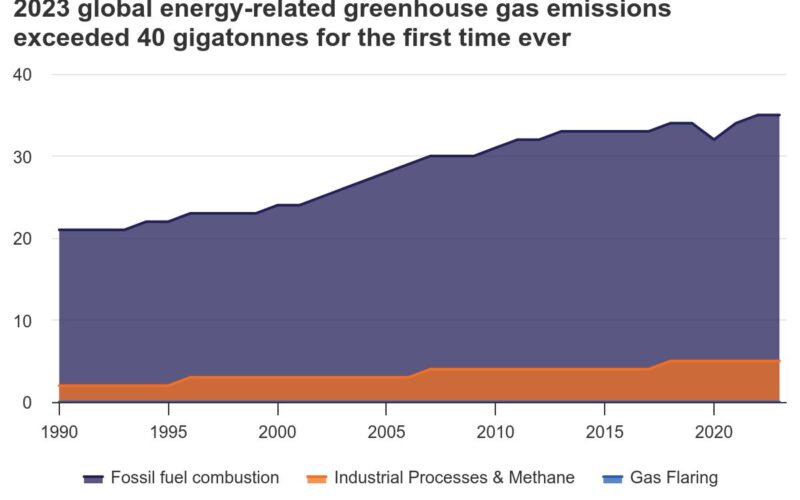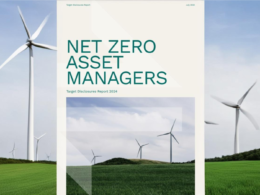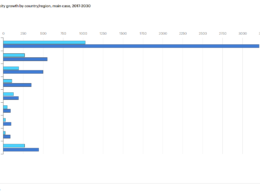The Energy Institute (EI), alongside KPMG and Kearney, has released the 73rd annual edition of the ‘Statistical Review of World Energy’, offering a comprehensive analysis of global energy data for 2023. The report highlights several key developments, including record-high energy consumption and emissions, a surge in renewable energy generation, and notable shifts in fossil fuel usage across regions.
Global primary energy consumption reached an all-time high of 620 Exajoules (EJ), marking a 2% increase from the previous year. Fossil fuel consumption, driven by coal and oil, rose to a record 505 EJ, accounting for 81.5% of the global energy mix. Emissions from energy sources also increased by 2%, exceeding 40 gigatonnes of CO2 for the first time, underscoring the ongoing challenge of reducing carbon emissions despite rising energy demand.
Renewable energy generation saw significant growth, with wind and solar leading the way. Excluding hydro, renewable electricity production increased by 13% to 4,748 TWh, representing 74% of net additional electricity generation. Renewables now make up 8% of primary energy consumption, or 15% when including hydro, signaling progress in the shift towards cleaner energy sources.
In Europe, the ongoing conflict in Ukraine continued to reshape gas markets. According to the report, European gas demand dropped by 7%, and Russia’s share of EU gas imports fell to 15%, down from 45% in 2021. Liquefied natural gas (LNG) imports outpaced piped gas for the second consecutive year, highlighting a significant rebalancing in the region’s energy landscape.
Advanced economies saw a notable decline in their reliance on fossil fuels. In Europe, fossil fuel consumption fell below 70% of primary energy for the first time since the Industrial Revolution, driven by increased renewable energy usage and reduced demand. Similarly, the United States saw its fossil fuel share decline to 80% of total energy consumption, indicating a gradual shift towards cleaner energy sources.
Emerging economies, however, continue to face challenges in curbing fossil fuel growth. In India, fossil fuel consumption rose by 8%, accounting for nearly all demand growth, while Africa’s energy consumption saw a slight decline of 0.5%, with fossil fuels making up 90% of the total. China, meanwhile, experienced a 6% increase in fossil fuel consumption, though its share of primary energy has been declining since 2011. China also added 55% of the world’s renewable energy capacity in 2023, surpassing the rest of the world combined and overtaking Europe in energy consumption per capita for the first time.
These findings illustrate both the progress and challenges in transitioning to a more sustainable global energy system, with significant regional disparities in the pace of change.
EI President Juliet Davenport OBE HonFEI said, “Energy is central to human progress. It is also now central to our very survival. With global temperature increases averaging close to 1.5°C, 2023 was the warmest year since records began, and the increasingly severe impacts of climate change were felt across all continents. In this Year’s Statistical Review, we report on another year of highs in our energy hungry world. 2023 saw record consumption of fossil fuels and record emissions from energy, but also record generation of renewables, driven by increasingly competitive wind and solar energy.”
EI Chief Executive Nick Wayth CEng FEI, said, “The progress of the transition is slow, but the big picture masks diverse energy stories playing out across different geographies. In advanced economies we observe signs of demand for fossil fuels peaking, contrasting with economies in the Global South for whom economic development and improvements in quality of life continue to drive fossil growth.”
Simon Virley CB FEI, Vice Chair and Head of Energy and Natural Resources, KPMG in the UK said, “In a year where we have seen the contribution of renewables reaching a new record high, ever increasing global energy demand means the share coming from fossil fuels has remained virtually unchanged at just over 80% for yet another year.”
Romain Debarre FEI, Partner and Managing Director Energy Transition Institute, Kearney said, “With global temperature increases closing in on 1.5°C, we hope that this report will help governments, world leaders and analysts move forward, clear-eyed about the challenge that lies ahead, and ready to take a lead in promoting and enabling the use of clean energy across the world.”






















